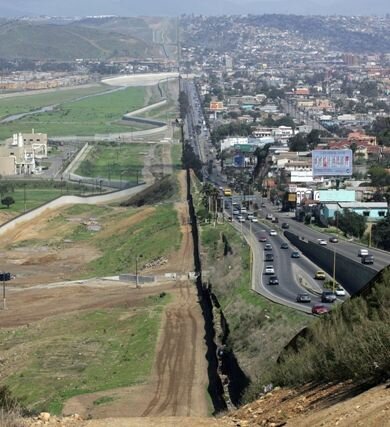Mexico and the U.S.
Featured, Immigration — By Ray Suarez on June 29, 2010 at 06:29How would you describe the state of the relationship between Mexico and the United States? On the latest edition of Destination Casa Blanca, a group of area experts described it as pretty good. Sure, there are bound to be some problems when countries share a nearly 2000-mile border, and one has a per capita income seven times the other. Even with the tensions on the border around the work of Mexican drug cartels, and the steady flow of weapons south, our observers saw improvements along with the problems.
No one was Pollyanna-ish… no one was unrealistic about the state of play. President Felipe Calderon of Mexico came to Washington for a state visit just recently, and had a long list of domestic and bilateral challenges to present to President Obama and the Congress. The death toll has spiked as drug gangs fight each other and the Mexican Army. As the drug-related crime has become steadily more brutal, gruesome, bizarre even, the flow of methamphetamine, marijuana, cocaine, and other controlled substances continues unabated.
In the past few days, in an essay published in national newspapers, and in an address to his people on nationwide TV, the Mexican president likened being next to the US like living next door to a drug addict. The US has been fighting its War on Drugs for more than 40 years, since the first drug czar was appointed by the Nixon Administration. The Mexican government has asked for more treatment programs, along with other demand curtailment. The US Secretary of State, Hillary Clinton, assured the Mexican leadership there would be no move toward decriminalization in the United States, even as several states move toward doing exactly that in upcoming ballot initiatives. Officials on both sides of the border must be watching California with anxiety: whatever policy is dictated in Washington can easily be undermined by the biggest state in the American union deciding to go another way.
By militarizing the conflict early in his six years as president, Felipe Calderon has tied his presidency to the fight against the cartels. Even as his years as president featured fiscal restraint and an economy that managed to stay stable even as the US plunged into crisis, his success or lack of success in the fight against the narcos will likely make or break his reputation. His approval by rank and file Mexicans at the outset of the military operations was high… and has lately declined with the escalation. And while Mexican voters sympathize with Calderon’s point about American culpability in his own country’s drug-related woes, they aren’t willing to let him entirely off the hook.
Panelist Francisco Gonzalez, a professor of Latin American studies at the John Hopkins School of Advanced International Studies, pointed out it is impossible to talk about each of these problems in isolation… NAFTA’s impact, drugs, unemployment, urbanization. Prof. Gonzalez noted that agricultural reform and the location of American industries on the border led to rapid growth of what had been small cities in northern Mexico, like Ciudad Juarez.
When the maquiladoras declined a population vulnerable to sudden swings in unemployment was created, and a desperation increasingly exploitable by drug gangs looking for fresh recruits. The conversation was a reminder of how different your conclusions can be about Mexico, depending on ideology, context, point of view.
Is Mexico a country of stronger institutions, more fidelity to the rule of law, as some claim? Or is it still the stereotypical home to corruption, cops on the take, and a slap on the wrist for politically-connected defendants? Is the extradition of more than a hundred drug gang defendants to the United States an encouraging sign of inter-American cooperation, or simply a sign than an over-matched Mexican government is afraid of the attacks that holding or prosecuting the accused narcos could bring? Has the steady increase of trade among the three NAFTA partners justified the passage of the treaty in the early days of the Clinton Administration, or a continually frustrating pact that remains far short of the promise alleged during the first Bush Administration that negotiated it?
We devoted sections of the program to NAFTA, immigration, the drug war, and the state of the bilateral relationship.
Watch excerpts of this edition of Destination Casa Blanca from our guests, Prof. Francisco González, Juan Carlos Hidalgo of the Cato Institute, Katie Zaunbrecher of the Council on Hemispheric Affairs, and Maureen Meyer of the Washington Office on Latin America at www.hitn.tv/dcb
After you’ve watched the conversation, add your own opinions to the blog. Let us know what you’re thinking, in the wake of the rising number of deaths in Mexican cities, the Calderon visit to Washington, the Mexican president’s explanations to his own people about the struggle against trafficking, President Obama’s decision to send more than a thousand National Guardsmen to the border, and the continuing debate over comprehensive immigration reform.
Tags: Cato Institute, Gun Control, Immigration, Mexico, Mexico Drug Violence, US-Mexico Border, War on Drugs, World NewsAuthor: Ray Suarez (5 Articles)

Ray Suarez, Host of Destination Casablanca on HITN.tv is an award-winning broadcast journalist and celebrated author. As host of this ground-breaking public affairs program, Suarez conducts an hour-long, Washington Roundtable every week with policymakers, elected officials and members of the Democratic and Republican parties from the DCB studios in Washington, DC.



 Share This
Share This Tweet This
Tweet This Digg This
Digg This Save to delicious
Save to delicious Stumble it
Stumble it





 Did we learn any lessons from the hurricanes in the past five years?
Did we learn any lessons from the hurricanes in the past five years? Searching for whitopia: An improbable journey to the heart of white America
Searching for whitopia: An improbable journey to the heart of white America







